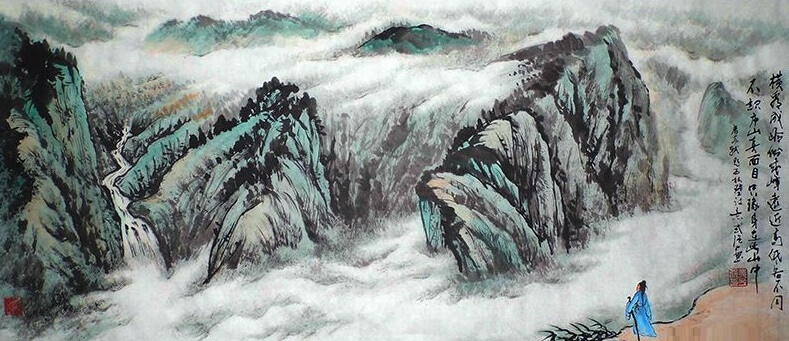Written on the Wall of the West Woods Temple
- Poetry of Su Shi
《题西林壁》Su Shi was a jack of all trades back in the Song Dynasty. After visiting the mountains, he wrote this poem with the intention of reminding readers to not be blinded by personal prejudices so that we can see things as they really are.
This poem was composed in 1084 when our poet Dongpo was transferred to Ruzhou which is closer to the capital, a positive gesture from the Royal Court. The temple was on his way to the new post, so he visited his monk friend Can Liao there in Mt Lu (庐山) in Jiangxi, a well-known sightseeing destination.
Again the first two lines present the complexity of the natural beauty he saw while climbing Mt Lu, leading to the theme in the second couplet – an elevation of a conscious realisation that the subjective perspective could be incomplete, even misleading, as against the objective view of the whole picture of the world. I’d say this poem could serve as a good example of the Song ci poems which tend to seek a profound philosophical connotation to enlighten people’s mind with simple everyday language, a spiritual attitude of Zen. The last couplet has become a popular proverb in Chinese language.

A mountain range in panorama becomes a peak from the side,
Far, near, high and low, with no two alike.
I do not to know the true face of Lushan Mountain;
Only because I myself am in the mountain.
横看成岭侧成峰,远近高低各不同。
不识庐山真面目,只缘身在此山中。
- Why Chinese poems is so special?
- The most distinctive features of Chinese poetry are: concision- many poems are only four lines, and few are much longer than eight; ambiguity- number, tense and parts of speech are often undetermined, creating particularly rich interpretative possibilities; and structure- most poems follow quite strict formal patterns which have beauty in themselves as well as highlighting meaningful contrasts.
- How to read a Chinese poem?
- Like an English poem, but more so. Everything is there for a reason, so try to find that reason. Think about all the possible connotations, and be aware of the different possibilities of number and tense. Look for contrasts: within lines, between the lines of each couplet and between successive couplets. Above all, don't worry about what the poet meant- find your meaning.
- A Song of the Spring Palace
- Poems on Army Life IV
- Poems on Army Life V
- West Palace, Autumn
- Hearing the River-Song
- The Lotus Gatherers